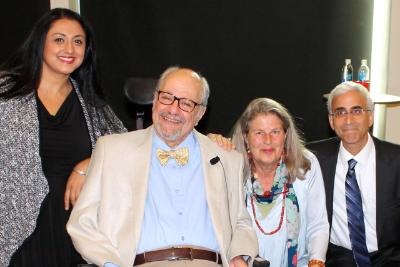A psychologist and host of the National Public Radio show Voices in the Family, Gottlieb delivered the inaugural talk in the new UMindfulness Lecture Series on Tuesday, March 4, at the University of Miami.
The lecture series is part of the UMindfulness Research and Practice Initiative, an interdisciplinary collaboration led by Dr. Amishi Jha, associate professor of psychology in UM’s College of Arts & Sciences, and Scott Rogers, director of the Mindfulness in Law Program at the UM School of Law.
 |
Dr. Amishi Jha, Dr. Dan Gottlieb, Maria T. Kluge, Scott Rogers |
Professor Jha, a contemplative neuroscientist, introduced the lecture, which aims to bring mindfulness research and training to the larger University of Miami Community and beyond. Jha said the cutting-edge field of contemplative neuroscience, which is part of the UM’s broader “Brain Initiative,” is seeking to discover if mindfulness training “changes the brain’s structure and function, and if it promotes psychological health, resilience, and the ability to optimize performance while allowing for greater ease and balance.”
Mrs. Maria T. Kluge provided the funding to initiate the UMindfulness Lecture Series, with the intention that like-minded supporters will provide additional resources to continue the series and help support innovative research and programs at UM in the future. The lecture series will allow scientists, public figures, and inspired leaders an opportunity to share their insights on mindfulness.
Dr. Gottlieb’s talk was titled “A Mindful Journey from Trauma to Recovery to Gratitude and Love.” He discussed “feeling different” his whole life – as a child with an undiagnosed learning disability, as a young teenager victimized by sexual abuse, and after a horrific automobile accident left him paralyzed from the chest down.
Gottlieb discussed his profound sense of alienation in the days following his accident. As he recuperated in the intensive care unit, a nurse who knew he was a psychologist asked if she could discuss some personal issues with him. While he counseled the nurse after her shifts each day, Gottlieb gained a sense of purpose. He said, “Without words, she showed me that I had value.”
One of Gottlieb’s life lessons – “approach everyone with a curious mind and an open heart” – led him to an eight-week session through Dr. Michael Baime’s Penn Program for Mindfulness. The initiative was founded to help patients with serious health conditions cope with the stress, pain and losses of their illness. It changed Gottlieb’s life, and his outlook.
Gottlieb said mindfulness helps him “bear witness to (his) own experience of life,” adding that everyone he knows who has recovered from trauma could count on one reliable and supportive person. He said, “We all have the responsibility to be that person. Everything is a habit – even love. The more you do it, the easier it is to do.”
For more information on the UMindfulness Research and Practice Initiative, visit http://mindfulness.miami.edu. To learn more about Dr, Jha’s research, follow her on Twitter, @amishijha, or visit http://attention.psy.miami.edu.

